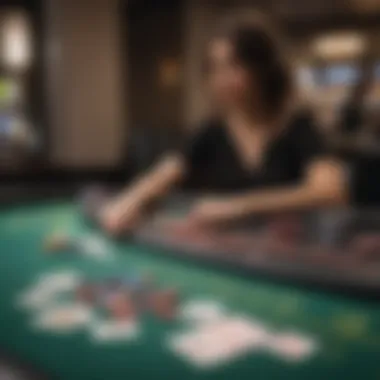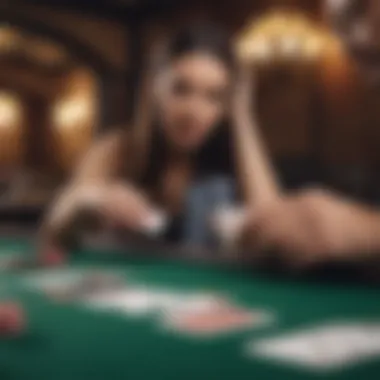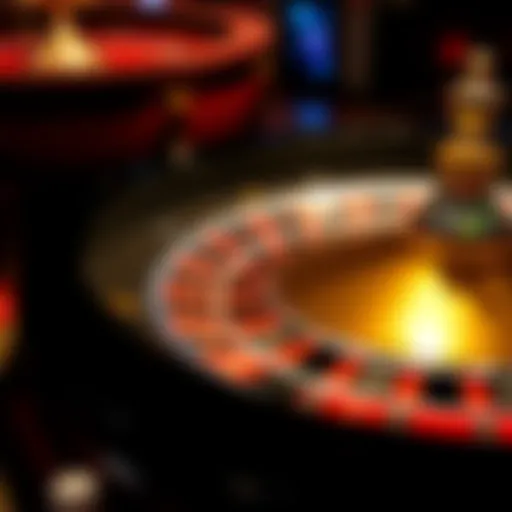Mastering Blackjack: Strategies for Optimal Profitability


Intro
Blackjack, one of the most popular card games in casinos, melds chance with strategy in a unique blend that keeps players coming back for more. Whether you’re a casual player or a seasoned gambler, understanding the nuances of the game can turn a fun night out into potential financial gain. This guide digs deep into winning strategies, focusing on how players can enhance their profitability. By grasping the game's rules, delving into advanced techniques, and managing one's bankroll effectively, readers can increase their chances at the table while enjoying the game.
Betting Strategies
In blackjack, betting strategically is crucial. Players might think of their bets as their ticket to success. A well-planned approach can lead to a more enjoyable experience and ultimately better results.
Understanding Odds and Payouts
Grasping the odds and payouts in blackjack is pivotal. The game typically offers a payout of 3:2 for a blackjack, which is when the player has an Ace and a ten-point card. On the flip side, winning a normal hand pays 1:1. However, it's vital to remember that the house always holds a slight edge. Understanding the odds allows players to make informed betting decisions.
An important aspect is the concept of the "insurance" bet. If the dealer shows an Ace, players have the option to take insurance, which pays 2:1 if the dealer has a blackjack. However, this is often deemed a bet to avoid, as the odds aren’t generally favorable for the player in the long haul.
Advanced Betting Techniques
For those looking to escalate their game, exploring advanced betting techniques can be fruitful. One such method is the Martingale Strategy, where a player doubles their bet following a loss. This assumes that eventually, a win will cover all previous losses. But beware; it carries risk, especially with table limits in casinos.
Another tactic involves flat betting, where players stake a consistent amount regardless of wins or losses. This method can decrease volatility and help in preserving the bankroll during downturns.
Psychological Aspects of Blackjack
It’s not just numbers and cards; the mental side of the game plays a significant role. Maintaining composure, managing emotions, and knowing when to walk away can impact your bottom line significantly. Players can train themselves to be aware of "tilt," where frustration leads to poor decisions. Keeping a clear head can separate winning players from the amateurs.
"Success in blackjack comes from understanding not only the math but also the mind game."
Additionally, paying attention to other players can provide insights into betting patterns and strategies. Engaging with fellow players can add to the learning experience.
By integrating systematic betting strategies, a sound understanding of odds, and a firm grasp on the psychological aspects of the game, players stand a better chance at turning their gameplay into profit.
Understanding Blackjack
In the world of gambling, blackjack stands as a notable pillar, commanding attention not only due to its popularity but also because of the strategic depth it offers. Gaining a solid understanding of blackjack is essential for anyone looking to enhance their profitability at the table. The knowledge of the game's history, basic rules, and objectives lays a strong foundation for players aiming to develop effective strategies that can lead to increased winnings. It's not just about luck; it's about utilizing informed decisions at the right moments.
Historical Context of the Game
Blackjack's roots stretch deep into history, believed to have originated from a card game known as vingt-et-un, played in France in the 1700s. Players sought to achieve a hand sum of 21 while outsmarting the dealer. Over the decades, this game evolved, gaining a foothold in American casinos during the 19th century. It underwent name changes and rule adaptations, settling on what we now recognize as blackjack, particularly after a promotional twist offering bonus payouts for having an ace of spades and a black Jack.
Delving into its historical context not only enriches the player's understanding but also invokes a cultural reverence for the game. Understanding how blackjack transitioned through various eras informs players about how rules have changed and what strategies may work best in modern gameplay, leading to a more informed gambling experience.
Basic Rules and Objectives
For newcomers to blackjack, grasping the basic rules and objectives is crucial. The main goal is straightforward: to get as close to 21 as possible without exceeding it, all while having a higher total than the dealer. Here's a simple breakdown of some key components:
- Card Values: Cards 2 through 10 are worth their face value. Kings, Queens, and Jacks are each worth 10. Aces can be worth either 1 or 11, depending on what best serves the hand.
- Gameplay Flow: Each round begins with players placing their bets. The dealer deals two cards to each player and two for themselves—one face up and one face down. Players then decide whether to hit (take another card), stand (keep their current hand), double down (double the bet for one more card), or split (divide pairs into two hands).
- Winning: A player wins by achieving a hand total higher than the dealer’s, or if the dealer busts (exceeds 21). It’s also important to note that dealers usually hit until they reach 17 or higher.
"Blackjack isn't just a game of chance; it's about mastering the odds and using strategy to dictate your fate."
Understanding these basic rules equips players with the necessary tools to make educated decisions at the table. Familiarity with the game’s flow and objectives not only enhances engagement but ultimately plays a pivotal role in developing more complex strategies to improve profitability.
Game Variations and Their Impacts
When we talk about strategies for increased profitability in blackjack, understanding game variations is crucial. Different versions of blackjack not only tweak the rules but also influence the house edge, player strategies, and ultimately the profit potential. A thorough grasp of these variations can provide players with a richer experience and better odds, allowing for a tailored approach depending on where they sit at the table, whether it’s in a bustling casino or online.
Classic Blackjack
Classic blackjack is often regarded as the standard variant, featuring straightforward rules. In this version, players aim to beat the dealer by getting as close as possible to 21 without exceeding it. Typically, this game uses one to eight decks and follows traditional rules like doubling down on 10 or 11 and splitting pairs. The dealer must hit on any hand totaling 16 or lower and stand on 17 or higher.
One of the key advantages of classic blackjack is its relatively low house edge, averaging around 0.5% when employing basic strategies. This makes it a favorable option for players looking to maintain their bankroll while maximizing their winning odds.
European Blackjack
European blackjack differs significantly from its classic counterpart mainly in dealing and some rule variations. In this form, the dealer only receives one card face up until all players complete their hands. If a player stands on their hand, the dealer's second card is revealed. This adds a layer of strategy since the player can't make decisions based on the dealer's hole card initially.
Furthermore, European blackjack typically lacks the option for the dealer to hit behind a soft 17, which can slightly tilt the house edge in favor of the player. Understanding when to capitalize on this can help sharpen profitability, making knowledge of this version essential for strategic players.
American Blackjack
American blackjack introduces additional elements that can impact gameplay and the strategies you implement. In this version, players can also double after splitting pairs, which can lead to increased payouts but also greater risks if not managed carefully.
Moreover, American blackjack features the option for the dealer to check for blackjack when showing an Ace. If they have a blackjack, players lose their bets unless they also hold a blackjack of their own. This rule change slightly increases the house edge compared to European blackjack, creating a need for players to adapt their strategies to this reality. Players need to remain vigilant in reading the table dynamics and adjusting their approach accordingly to keep profitability in check.


Live Dealer Blackjack
Live dealer blackjack has surged in popularity, bridging the gap between online and offline experiences. This variant streams real dealers in real time, creating a social atmosphere similar to live casinos while maintaining the conveniences of online gaming. Players can interact with dealers and other participants, which adds to the enjoyment and engagement.
However, the rules may vary across platforms, causing shifts in strategies. Players should familiarize themselves with the specific game rules before engaging. The benefits are clear; with the right understanding and strategies, utilizing this interactive format can enhance profitability, as players often feel more connected and capable of making informed decisions in the live environment.
Fundamental Strategies in Blackjack
In the realm of blackjack, establishing a solid foundation is critical to enhancing one's chances of profitability. Fundamental strategies play a pivotal role in shaping the decisions that players make at the table. By understanding these approaches, players can effectively minimize the house edge and optimize their betting strategies.
The significance of mastering fundamental strategies cannot be overstated. These strategies not only improve decision-making but also instill a sense of confidence in players, enabling them to react appropriately based on the cards they hold and the dealer's visible card. Let’s break down the essential aspects of fundamental strategies in blackjack.
Understanding Basic Strategy Charts
Basic strategy charts encompass the primary guidelines for playing blackjack optimally. These charts are predicated on the dealer's upcard and the player's total hand value. They detail when to hit, stand, double down, or split pairs, depending on the specific game rules in place.
In using a basic strategy chart, a player can significantly reduce the house edge. For instance, if a player’s hand totals twelve and the dealer shows a five, the chart will typically suggest standing. Conversely, if the dealer has an ace showing, hitting in this situation would be a recommended action instead. This decision-making tool provides clarity and minimizes emotional influence in high-stress situations.
The mark of a proficient blackjack player is one who can use these charts effectively, often memorizing key positions to enhance gameplay. While it may seem daunting to learn the chart at first, with practice, it becomes second nature. A common mistake is to rely solely on instinct rather than these well-researched charts, leading to costlier decisions.
When to Hit, Stand, Double, or Split
Knowing when to hit, stand, double, or split isn’t just a matter of luck; it hinges on understanding the game dynamics and the optimal plays. Each action should be weighed carefully based on the current hand and the dealer's card.
- When to Hit: Players should look to hit when their hand is below twelve. Hitting is the correct decision when the total is low, particularly if the dealer is showing a strong card, like a ten or an ace. For example, a hand totaling eight against a dealer’s ten necessitates a hit to improve chances.
- When to Stand: The general rule here is to stand on hard totals of seventeen or higher. If your total is close to twenty-one and the dealer’s card is weak, such as a four, five, or six, standing is typically favorable.
- When to Double: Doubling down refers to doubling your bet after receiving the initial two cards. This option works well with totals of ten or eleven when the dealer's upcard is less robust. For example, a player holding an eleven against a dealer’s six is in a prime position to maximize potential winnings through doubling.
- When to Split: Splitting is applicable when a player starts with two cards of the same rank. A common strategy involves splitting aces or eights, as this can lead to favorable outcomes. However, players should avoid splitting tens or five's, as these hands are likely stronger as a whole.
In summary, the interplay between when to hit, stand, double, or split is crucial in pursuing profitability in blackjack. Understanding these strategies helps mitigate emotional choices and reinforces rational decision-making.
"In blackjack, the better your decisions, the lower the house edge."
Incorporating these fundamental strategies into your blackjack arsenal is essential, as they provide the groundwork for advancing to more sophisticated techniques. With a solid grasp of these strategies, players are better positioned to combine luck with skill, maximizing their chances at the blackjack table.
Advanced Techniques for Success
When it comes to maximizing profits in blackjack, understanding advanced techniques is crucial. These strategies not only sharpen your skills but also give you a significant edge over the house. In a game that often feels as much about luck as it is about skill, applying these advanced approaches can transform your playing experience from merely entertaining to truly profitable.
Card Counting Explained
Card counting is perhaps the most notorious of all advanced blackjack techniques. The essence of this strategy lies in tracking the ratio of high to low cards remaining in the deck or shoe. The idea here is simple: high cards favor the player, while low cards tilt the odds in favor of the dealer.
When players count cards, they assign values to different cards while they are played. For example:
- Low cards (2-6) = +1
- Neutral cards (7-9) = 0
- High cards (10-Ace) = -1
By keeping a running total, players can infer the composition of the remaining cards. The higher the count, the more advantageous it becomes to increase your bets. However, it requires practice to master this skill. Moreover, casinos are adept at spotting card counters and may ask them to leave. It’s more an art than a science, and like any good investment strategy, it comes with risks.
The Hi-Lo Method
The Hi-Lo method is one popular approach to card counting. It’s straightforward, making it accessible for newcomers. The great thing about this method is that it can be performed without the need for complex math or any reliance on electronic devices—even the casual player can pick it up fairly quickly. Here’s how it works:
- Assign Values: As mentioned earlier, low cards get a +1, high cards get a -1, and neutral cards are scored at 0.
- Keep Track: Maintain a running count as each card is dealt.
- Convert to True Count: To adjust for multiple decks, divide your running count by the number of remaining decks.
- Adjust Your Bets: Higher true counts suggest increasing your bets, while lower counts may mean sticking to the minimum.
This method is not foolproof, but it can clearly shift the odds more in favor of observant players.
Bet Sizing Techniques
Managing your bets is equally as important as the cards you play. Bet sizing strategies can save you during streaky sessions and help maximize your return during winning periods. Here are some essential techniques to consider:
- Flat Betting: Bet the same amount every time. This is relatively safe and can preserve your bankroll, but it may not capitalize on favorable situations.
- Proportional Betting: Adjust your bets based on the current size of your bankroll. For instance, if your bankroll is $500 and you decide to bet 5%, you'd wager $25. As your bankroll fluctuates, so do your bets.
- Positive Progression Systems: Increase your bet after a win and decrease it after a loss. This way, you can take advantage of hot streaks while minimizing losses during cooler ones.
- Negative Progression Systems: Although more risky, these involve increasing your bets after a loss. This can be effective in recovering losses, but it’s crucial to be cautious.
Remember, all these techniques require self-discipline and awareness of your emotional state while playing. The balance between risk and reward is delicate, and improving your understanding of these strategies may be the key to upping your game.
"In blackjack, as in life, knowing when to take risks and when to hold back can make all the difference."
By integrating these advanced techniques into your play, you can elevate your blackjack strategy and better position yourself for profitable outcomes.
Bankroll Management Strategies
Effective bankroll management is the backbone of sweet success in blackjack. This strategy not only involves knowing how much money you can afford to lose but also dictates how you wager those funds. Failing to manage your bankroll properly can lead you down a dark path of financial loss, so understanding this aspect is crucial for anyone taking the plunge at the blackjack table.
Setting a Budget


First things first: setting a clear budget is paramount. Before you even sit down at the table, establish how much money you’re willing to devote to your gaming session. This doesn’t just mean the cash on hand but encompasses your entire bankroll. Think about it as an investment, where you're defining a limit to safeguard yourself from overextending your finances.
It’s a good idea to set this budget based on your monthly expenditures and personal savings. For example, if you earn a paycheck of $3,000, you may decide that $100 a week is an acceptable amount to spend on gambling. This way, you’re not placing all your eggs in one basket. Remember, stick to this budget like glue; it’s your safety net.
Tracking Wins and Losses
Next is tracking your wins and losses. It sounds tedious, but having a clear record of your gaming history can do wonders for your future play. You can use apps or a simple notebook—whatever floats your boat. The key is to be diligent and honest.
- Why Track?
Knowing how much you win or lose helps you gauge whether your strategy is effective. If you continuously find yourself in the red, it might mean it's high time to adjust your approach or reconsider the games you're playing. - What to Record?
- Date of the game
- Amount bet
- Wins and losses
- Strategies employed
Over time, you might notice patterns or recurring mistakes. This data allows you to learn and adapt your strategies to boost profitability.
Adjusting Bets Based on Bankroll
Lastly, adjust your bets in line with your bankroll. This isn’t just about increasing the stakes when you’re riding high or scaling back when you hit a rough patch; it's about making calculated decisions. Experienced players often recommend a 1% to 5% bet of your total bankroll on a single hand. This ensures that even in losing scenarios, you’re not wiped out.
- Low Bankroll:
When your funds are dwindling, opt for smaller bets to allow for longevity. - Healthy Bankroll:
Conversely, if your bankroll is flourishing, you could slightly increase your bet, although caution is still key.
In the end, an ideal strategy for adjusting bets hinges on blending your financial situation with your personal comfort level with risk.
"Good bankroll management can be as important as any strategy you use at the table. It’s the sife that underpins all your play."
By paying attention to your bankroll, meticulously tracking wins and losses, and adjusting bets smartly, you'll significantly enhance your journey in blackjack, enjoy the ride more, and hopefully, see those profits trickling in.
Psychological Factors in Blackjack
When it comes to playing blackjack, the mental game can often overshadow the technical aspects. Understanding the psychological factors in blackjack can be the difference between walking away with a profit or facing a loss. The way emotions and mindset influence decisions cannot be overstated; it deeply affects choices made at the table and ultimately impacts profitability.
Managing emotions is crucial, as reactions to wins and losses can cloud judgment. A player’s emotional state can change from one hand to the next, leading to erratic betting patterns and poor choices. Being aware of this aspect can empower players to maintain a level head and make rational decisions that align with their strategic game plan.
Moreover, the ability to regulate emotions can also boost a player's stamina in the game. It’s easy to get swept up in the excitement or frustration that blackjack can stir. Recognizing this helps players adhere to their plans instead of allowing fleeting feelings to steer them off course. When emotions are kept in check, players are better equipped to capitalize on opportunities that arise within the game.
The Role of Emotion in Decision Making
The influence of emotion on decision making in blackjack is profound. During gameplay, winning can lead to a rush of exhilaration, prompting players to take on riskier bets. On the flip side, a losing streak can bring about panic, pushing a player to alter their strategy in desperate attempts to recover losses.
Consider the following points about emotion's impact on decision making:
- Confidence: Winning hands can inflate a player’s confidence, often leading to over-bets. It's essential to remember that blackjack also includes an element of luck that can turn in an instant.
- Frustration: Losses can evoke frustration, commonly resulting in tilts, where players start making irrational choices. Even seasoned players can find themselves in this precarious situation.
- Excitement: High-pressure environments like casinos amplify emotional responses. Recognizing and managing these emotions is crucial for keeping a cool disposition at the table.
Players must cultivate self-awareness and discipline. Being attuned to one’s feelings can help in recognizing when emotions might begin to skew decision making. For instance, maintaining a calm and rational approach when winning or losing can often lead to superior strategic choices. Keeping emotions in check is not just a mental exercise; it’s a crucial strategy in sustaining profitability.
Overcoming Tilt
Tilt refers to the state of emotional frustration or confusion that can derail a player’s thinking. In blackjack, being on tilt usually leads to poor betting decisions and reckless play. Understanding how to overcome this state is vital for anyone aiming for consistent outcomes.
Here are some effective strategies to combat tilt:
- Recognize the Signs: Being aware of the early indicators of tilt is the first step in overcoming it. If a player notices frustration creeping in after a bad hand, it's time to step back.
- Time Out: Taking a break from the game can work wonders. It allows the player to reset their mindset, preventing hasty decisions driven by emotion.
- Stick to the Strategy: Having a predetermined strategy limits the scope for emotional play. If a player finds themselves veering away from their strategy, it may be an indicator that they’re experiencing tilt.
- Accountability: Engaging with other players or a mentor can strengthen a player’s resolve to stick to sound decision making. Sharing experiences helps in recognizing shared emotional struggles at the table.
- Practice Mindfulness: Simple breathing techniques and grounding exercises can ease tension and bring focus back to the game.
By knowing how to handle tilt, players can safeguard their bankroll and sustain their enjoyment of the game.
"Success in blackjack doesn’t solely come from knowing the rules, it's equally about managing your mind."
In summary, the psychological dimensions of playing blackjack can’t be dismissed. Mastering these elements not only enhances a player’s experience but can also be a game-changer in sustaining profitability. To be a successful player at blackjack, cultivating emotional control and a strong mental game should be at the forefront.
The Legal Landscape of Blackjack
Understanding the legal landscape of blackjack is as crucial as grasping the game's basic strategies. Regulations and laws shape how we engage with blackjack, be it at a lively physical casino or through the vast web of online platforms. For anyone looking to increase their profitability, being aware of these legal frameworks is not just beneficial—it's essential.
Understanding Casino Regulations
Casino regulations govern everything about gambling establishments, from how games are played to how winnings are processed. Depending on the jurisdiction, these rules can vary widely. Here are some key elements to keep in mind:
- Licensing: Casinos must often obtain a license from the relevant authority to operate. This ensures they adhere to fair play standards.
- Payout Ratios: Regulations usually stipulate minimum payout ratios, making it essential to know whether your casino follows these guidelines. A casino that pays out above the mandated percentage might offer you better chances for profitability.
- Game Integrity: This includes regulations on game fairness and transparency. For instance, casinos are typically required to use shuffling machines to prevent any human error or foul play.
Understanding these regulations not only keeps you on the right side of the law but also allows you to choose casinos that will offer you the best playing conditions. As they say, "Knowledge is power," and in gambling, that power translates to making informed decisions that could shape your profits.
Online Blackjack Legislation


As the world finds its way deeper into the digital age, online blackjack has surged in popularity. However, the landscape is muddied by a patchwork of laws that governs online gambling differently around the globe. Here are a few standout points to consider:
- Jurisdiction Variations: Some countries have outright bans on online gambling, while others regulate it heavily. Countries like the UK have clear laws, while others may treat it as a gray area.
- Auditing and Regulations: Many online casinos are audited by independent bodies to ensure they operate fairly. This is an essential feature to look for when choosing where to play, as it can safeguard your interests and enhance fairness.
- Player Protections: Regulatory agencies often set up provisions to protect players—setting limits on bankrolls and mandating self-exclusion for those who seek it. Knowing these protections can not only enhance your safety but also contribute to responsible gambling practices.
In summary, a well-informed gambler navigates through blackjack with a clear understanding of the laws governing it. The emphasis on legality ensures not just a fair game, but also an atmosphere where one can engage without the lurking fear of repercussions. Gambling should remain a thrilling endeavor—not a risky one.
"To play is human, but to play wisely is divine."
Take these legal considerations seriously. They are not mere formalities but keys to better profitability and a more enriched gaming experience.
Online vs. Offline Blackjack
Understanding the distinctions between online and offline blackjack is essential for anyone serious about improving their game and boosting profitability. The choice between playing at an online casino or visiting a brick-and-mortar establishment can greatly influence your overall experience and potential winnings. Each option offers its own set of advantages and considerations that can affect gameplay, so it is vital to examine them closely.
One crucial factor that many players overlook is the convenience factor. Online platforms provide an accessible way to enjoy blackjack anytime and anywhere, requiring nothing more than an internet connection. This flexibility allows players to dive into a game between tasks or more leisurely during their off time. On the flip side, traditional casinos offer a unique ambiance and atmosphere that can’t be easily replicated in the digital sphere. Many players find that the sights and sounds of a live casino enhance their gaming experience, leading to a more immersive environment.
Advantages of Online Platforms
- Accessibility: You can play blackjack without geographic constraints. No long drives, no waiting for a table, just log in and play.
- Variety of Games: Online casinos usually have a wider selection of blackjack variants than a physical casino can provide. Players can experiment with classic, Spanish 21, or other unique variations with just a few clicks.
- Bonuses and Promos: Many online platforms offer attractive bonuses that can effectively increase your bankroll. Look out for welcome bonuses, no deposit bonuses, and cash-back incentives. These promotions can lead to more playing opportunities and possibly increase profit margins.
- Game Speed: Online games often run at a faster pace than those in brick-and-mortar casinos, allowing seasoned players to make more decisions and potentially capitalize on opportunities more rapidly.
Despite these advantages, some players can miss the social interaction that comes from playing at a live casino.
Social Dynamics of Live Casinos
- Human Interactions: Being among other players, dealers, and the general casino buzz can enhance the thrill of the game. This interaction can contribute to a player’s excitement and enjoyment of the game.
- Live Dealer Options: Some online platforms emulate this experience by offering live dealer games, where you can join a table and interact with a real dealer via video stream. It merges the convenience of online play with the live experience.
- Tactile Experience: The physical sensation of handling cards and chips has a certain appeal that’s hard to replicate digitally. This tactile interaction can add an extra layer of enjoyment, which isn’t present when tapping on a screen.
In summary, choosing between online and offline blackjack is a reflection of personal gaming preferences, lifestyle, and where you find the most enjoyment. Take your time and evaluate factors like convenience, desired social interaction, and your taste for different game types. Understanding these elements will help shape a more profitable gaming experience.
"In blackjack, as in life, it's often about knowing where the advantages lie and playing your cards, literally and figuratively, right."
Common Mistakes to Avoid
In the realm of blackjack, recognizing and avoiding common pitfalls can make the difference between a fruitful night at the tables or returning home empty-handed. The game, while inherently based on chance, requires a strategic mindset that is easily clouded by emotions or misconceptions. If players can steer clear of these common errors, they set themselves on a clearer path to profitability. Understanding these blunders can not only safeguard your bankroll but also enhance your overall enjoyment of the game.
Ignoring Basic Strategy
One of the most significant oversights that novice and even some seasoned players make is ignoring the basic strategy. Many players rely on gut feelings or past experiences rather than evidence-based strategies. The basic strategy chart is a player’s compass, outlining the optimal actions based on the player’s hand and the dealer’s up card.
- Why Basic Strategy Matters: This strategic framework reduces the house edge considerably. Without it, players may unwittingly enhance the odds favoring the casino. For instance, hitting when one should stand can lead to a rapid depletion of chips.
- Using Strategy Charts: These charts are not complex; in fact, they're often available at tables or online. They provide clear, digestible insights that remove guesswork from the decision-making process, allowing players to play more confidently.
"In blackjack, understanding the basic strategy can be your life jacket in a sea of risk. Without it, you’re bound to sink."
- Common Decisions: Misjudgments often occur around crucial moments, like whether to split pairs or when to double down. These decisions, taken lightly, can be costly. When one aligns their moves with the basic strategy, they benefit from a mathematically proven approach that maximizes potential winnings while minimizing losses.
Chasing Losses
Another detrimental habit that frequently plagues blackjack players is the tendency to chase losses. After a string of defeats, the impulse to recover lost money often leads to impulsive plays and increasing stakes, a vicious cycle that can spiral out of control.
- Understanding Losses: Losses are an inherent part of gambling, including blackjack. Accepting this reality can help players maintain composure and avoid emotional decision-making.
- The Pitfalls of Chasing: When players attempt to recover their losses by changing their strategies drastically—betting more than they normally would for example—they risk losing even more. This concept ties back to emotional control; it’s easy to give in to the frustration of losing, but grounding oneself with a clear plan is crucial.
- Setting Limits: It’s advisable to set win and loss limits ahead of time. This way, if you find yourself in a losing streak, being able to walk away can actually save your bankroll in the long run. Players who stick to their limits often maintain a more stable gaming experience.
Resources for Further Learning
In the world of blackjack, knowledge is a player’s best ally. Resources for learning not only serve to enhance understanding but also empower players to make decisions that can tip the scales in their favor. Whether you're a novice eager to understand the basics or an experienced player looking to hone your skills, the right resources will equip you with valuable insights.
The benefits of delving into learning materials are manifold. They provide clarity on the rules, introduce you to various strategies, and keep you informed of the constantly evolving trends in the casino environment. An astute player knows that staying updated can mean the difference between losing and winning big. Moreover, creative perspectives found in books and courses can inspire new tactics that traditional gameplay might miss.
Consideration goes into what type of resources are available. They can range from literature, which often offers historical context and strategy drills, to online courses that provide interactive opportunities to apply what you’ve learned. It’s crucial to find those resources that resonate with your learning style to maximize retention and application.
"Education is not preparation for life; education is life itself."
Books and Literature on Blackjack
Books on blackjack are treasure troves of information. They encompass everything from fundamental strategies to advanced tactics. Titles such as "Beat the Dealer" by Edward Thorp have been pivotal in shaping the way the game is approached. These texts break down the math behind card counting, turning an intricate concept into manageable tactics that anyone can strive to master.
Additionally, literature often explores the psychological aspects of gambling, shedding light on how mental resilience can influence gameplay. Some lesser-known, yet insightful books include "The Theory of Blackjack" by Peter A. Griffin and "Blackjack for Blood" by Bryce Carlson; these delve into analytical thinking and decision-making under pressure.
When engaging with any book, be prepared to take notes and apply the strategies discussed. Regular practice alongside reading reinforces knowledge, ensuring that your newfound wisdom isn't just theoretical but something you can execute at the tables.
Online Courses and Tutorials
In today’s digital age, online courses and tutorials have become widely accessible. They offer flexibility and can cater to varying skill levels. Whether it's through professional platforms or social media channels, there’s a wealth of content to choose from.
Websites like Reddit have communities dedicated to discussing strategies, where players share resources and insights, providing an informal yet rich learning experience. Furthermore, platforms like Facebook host groups where users debate and refine techniques, creating a lively exchange of ideas.
Moreover, online courses often come equipped with video demonstrations, real-time strategies, and quizzes that test your knowledge. This interactive format can significantly accelerate the learning process and give you a practical edge in your gameplay.
In summary, seeking out and utilizing resources for further learning about blackjack is a strategic move. Books ground you in theory, while online courses offer hands-on experience. Together, they build a solid foundation for profitability, enabling you to approach the tables with the confidence and knowledge required to thrive.















